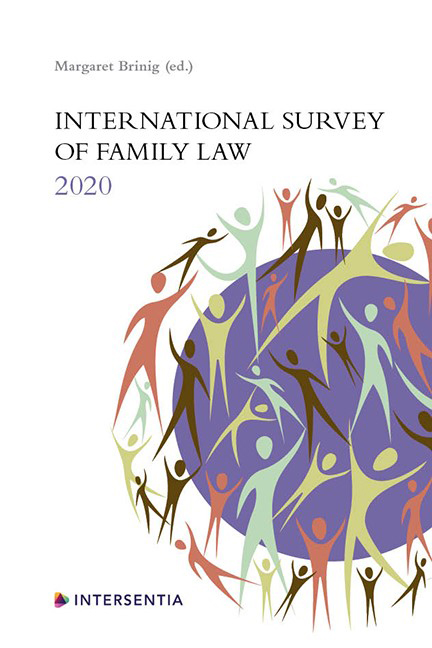Book contents
- Frontmatter
- Preface
- Contents
- List of Contributors
- Australia: The Search for Property in the Labyrinth of the Discretionary Trust
- Brazil: Intuitu Personae Adoption in the Brazilian Legal System
- Canada: Family Law at the Supreme Court of Canada
- China: Reform of the Marriage and Family Part of the Civil Code in China
- England and Wales: Beware of International Relationships
- European Court of Human Rights: Challenging Paternity under Case Law of the European Court of Human Rights
- France: A Chronicle of French Family Law: 2019
- Germany: Gender Identity, Sexual Orientation and Parentage: Family Law Lagging Behind
- Hong Kong: Hong Kong Family Law Today: Drowning not Waving?
- Korea: Full Guardianship in Korean Law: An Evaluation Over Seven Years from the Perspective of Family Court Practices and the Constitution
- Norway: The New Norwegian Adoption Act
- Poland: Discussion and Reform of Family Law in Poland
- Scotland: Making Scotland ‘The Best Place in the World to Grow Up’?
- Serbia: Child Maintenance and Welfare in Serbian Law
- Slovenia: New Regulation on Guardianship for Adults in Slovenia
- South Africa: Aspects of Dutch Colonial Family Law Related to the Indonesian Rajah of Tambora’s Exile at the Cape
- Sweden and California: On Children’s Rights to be Heard in Custody and Support Matters
- UN Committee on the Rights of the Child: Continued Reflections on Family Law Issues in the Jurisprudence of the CRC Committee: The Convention on the Rights of the Child @ 30
- Index
Brazil: Intuitu Personae Adoption in the Brazilian Legal System
Published online by Cambridge University Press: 09 February 2021
- Frontmatter
- Preface
- Contents
- List of Contributors
- Australia: The Search for Property in the Labyrinth of the Discretionary Trust
- Brazil: Intuitu Personae Adoption in the Brazilian Legal System
- Canada: Family Law at the Supreme Court of Canada
- China: Reform of the Marriage and Family Part of the Civil Code in China
- England and Wales: Beware of International Relationships
- European Court of Human Rights: Challenging Paternity under Case Law of the European Court of Human Rights
- France: A Chronicle of French Family Law: 2019
- Germany: Gender Identity, Sexual Orientation and Parentage: Family Law Lagging Behind
- Hong Kong: Hong Kong Family Law Today: Drowning not Waving?
- Korea: Full Guardianship in Korean Law: An Evaluation Over Seven Years from the Perspective of Family Court Practices and the Constitution
- Norway: The New Norwegian Adoption Act
- Poland: Discussion and Reform of Family Law in Poland
- Scotland: Making Scotland ‘The Best Place in the World to Grow Up’?
- Serbia: Child Maintenance and Welfare in Serbian Law
- Slovenia: New Regulation on Guardianship for Adults in Slovenia
- South Africa: Aspects of Dutch Colonial Family Law Related to the Indonesian Rajah of Tambora’s Exile at the Cape
- Sweden and California: On Children’s Rights to be Heard in Custody and Support Matters
- UN Committee on the Rights of the Child: Continued Reflections on Family Law Issues in the Jurisprudence of the CRC Committee: The Convention on the Rights of the Child @ 30
- Index
Summary
Résumé
Dans le présent article, la faisabilité juridique de l’adoption dite intuite personae ou dirigée est examinée, en tenant compte du cadre législatif actuel brésilien ainsi que des arguments favorables et défavorables. La position adoptée en fin d’article vise à encourager les échanges à ce sujet. La discussion s’appuie sur l’analyse d’éléments fondamentaux, tels que la définition de l’adoption elle-même, ses fondements normatifs et la solidarité ainsi que sur d’autres principes intrinsèques au thème, notamment celui dont la primauté est absolue : l’intégrité familiale et l’intérêt supérieur de l’enfant ou de l’adolescent. La recherche est éminemment bibliographique et se termine par une proposition de changement législatif.
INTRODUCTION
One of the purposes of the law is to protect people in society, and the family – the paramount human social organisation – has long been acknowledged as an essential element for any legal system, deserving special protection from public authorities, as is manifested by the rule of law.
In recognition of this, the 1988 Constitution of Brazil gave special protection to the family under its Article 226. It also expanded the ‘special protection’ situations, by recognising as a family entity the community formed by any of the parents and their descendants, and that resulting from a stable union, under the terms of Article 226, §§3 and 4. The denomination of ‘family’ when resulting from marriage, and ‘family entity’ for other forms, along with the constitutional provision that the law should facilitate the conversion of the stable union into marriage, has generated much debate about the possible recognition of one type of family organisation as more appropriate for society and individuals.
However, other types of relationship exist too. Convivial relationships different from those mentioned in the Constitution demand some kind of state recognition and, consequently, legal protection, even though there is no consensus about how such relationships should be treated, in terms of what is best for society as a whole.
In response to this, an attempt was made to expand the legal categories of family and family entity, aiming to accommodate, under different established institutions, the different situations that demanded legal recognition.
- Type
- Chapter
- Information
- International Survey of Family Law 20202020 Edition, pp. 23 - 34Publisher: IntersentiaPrint publication year: 2020

